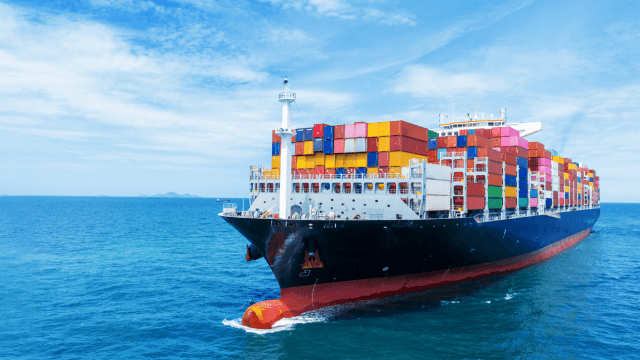Boost fleet efficiency with Alfa Laval’s OceanGlide air lubrication system
As shipping companies face growing pressure to reduce their carbon footprint and comply with stringent environmental regulations, Alfa Laval’s OceanGlide air lubrication system offers a game-changing solution.
DATE 2024-12-10OceanGlide air lubrication system moves the needle on energy efficiency
Shipping companies are under increasing pressure to adopt sustainable practices and reduce their carbon footprint to meet corporate social responsibility goals and consumer expectations.
Air lubrication: the future of energy efficiency
Alfa Laval OceanGlide combines air lubrication with fluidic technology to create an even air layer across the entire flat bottom of a vessel, which can be controlled and optimized. Vessels benefit from a 50–75% reduction in drag, which results in propulsion power savings of up to 12%. At the same time, vessels can achieve better overall performance with reduced hull resistance and improved speed.
By improving fuel efficiency and reducing wear and tear on engines and other components, OceanGlide enhances overall operational efficiency. It can also be integrated with performance monitoring systems, providing real-time data and analytics to help operators optimize fuel efficiency and operational performance.
This unique air lubrication system reduces CO₂ emissions, minimizes environmental impact, and enhances fleet efficiency with reduced fuel consumption. By lowering fuel consumption, OceanGlide directly reduces greenhouse gas emissions, supporting global sustainability goals. It also helps fleets comply with current and upcoming environmental regulations, while reducing the risk of non-compliance penalties.
Regulatory challenges
New, stringent environmental regulations are also adding to the squeeze, including the International Maritime Organization (IMO), the Environmental Protection Agency (EPA), the US Coast Guard (USCG), and Transport Canada, among others.
Ships are required by the IMO to calculate two ratings: their Energy Efficiency Existing Ship Index (EEXI) to determine their energy efficiency, and their annual operational Carbon Intensity Indicator (CII) and associated CII rating. The IMO’s reporting and rating system began in 2023 and applies to all ships above 5,000 gross tonnage.
The CII measures the grams of CO2 emitted per cargo-carrying capacity and nautical mile. According to the IMO, “carbon intensity links the GHG emissions to the amount of cargo carried over the distance travelled.” These regulations aim to reduce the carbon intensity of the global shipping fleet by 40% by 2030 and reach.
Consequences of a failing grade
Ships are now required to calculate their annual operational CII and report it to their flag state (flag states and port states are responsible for verifying and enforcing compliance with the CII regulations).
Ships are rated on a scale from A (best performance) to E (worst performance), based on their annual operational CII. Ships rated D for three consecutive years or E for a single year must submit a corrective action plan to improve their rating. Non-compliance can lead to penalties and restrictions on ship operations.
Those with B or C ratings are encouraged to voluntarily strive toward reaching an A rating, which demonstrates their commitment to sustainable shipping and alignment with global standards.
How compliance could impact operations
Since the CII rating is calculated annually, shipping companies will need to stay up-to-date with evolving regulations to ensure their fleet remains compliant—and avoid penalties and operational restrictions. Working towards or maintaining an A rating will have several impacts, including:
- Operational Changes: To improve their CII rating, ships may need to optimize routes, reduce speeds and implement other operational measures.
- Technological Upgrades: Investments in energy-efficient technologies and alternative fuels may be necessary.
- Increased Monitoring: Enhanced monitoring and reporting systems will be required to track and report CII data.
- Market Differentiation: Ships with higher CII ratings (A or B) may gain a competitive advantage in the market.
In the wake of these new regulatory standards, many shipping companies are looking to modernize their fleets, making air lubrication an attractive option for sustainable shipping. Both new builds and retrofitting existing vessels with air lubrication systems are viable paths to achieving greater efficiency and sustainability.
Stay compliant with OceanGlide
OceanGlide is designed for seamless integration with various vessel types, backed by Alfa Laval’s technical support and training to facilitate smooth implementation. We can also provide detailed ROI analyses to demonstrate the long-term financial benefits of investing in air lubrication technology.
Don’t wait until you get a failing compliance grade to improve sustainability. Schedule your free consultation with one of our experts today!
Increase your ship’s efficiency and sustainability with air lubrication
Discover the impact of air lubrication technology on fuel savings and compliance. Access Your Free eBook now.

